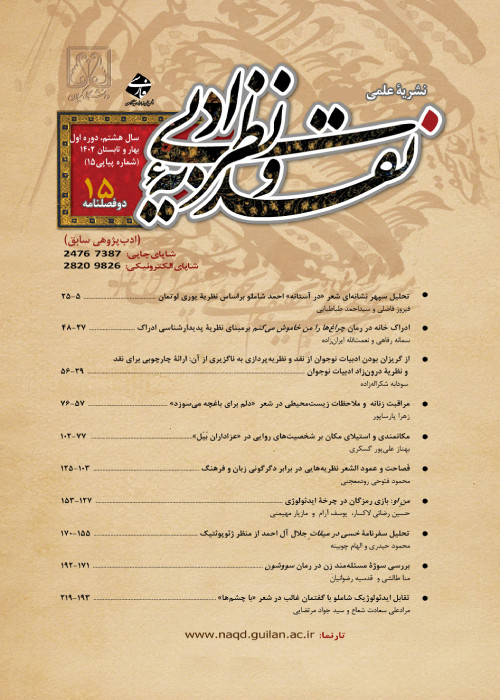A Study of Golshiri’s Prince Ehtejab, based on Kristeva’s Abjection Theory
Julia Kristeva is one of the theorists who have tried to establish a close connection between literature and psychoanalysis by proposing various theories in areas such as literary criticism, feminism, and psychoanalysis. She seeks to examine the relationship between language and the subject in dialectical and dynamic processes by proposing concepts such as the speaking subject, the symbolic and the semiotic, thus clarifying the connection between psychoanalysis and language with the notion of abjection. Abjection is a process through which the linguistic subject, by entering the symbolic realm, considers anything that threatens the boundaries of its subjectivity as the other and tries to reject, deny and repress it. In this paper, Houshang Golshiri’s novel Prince Ehtejab is read based on Kristeva’s theory. In this reading of the novel, we are confronted with Prince Ehtejab’s pain, wounds and the evils of his soul. After a futile attempt to rid himself of all that he assumes contaminated, and to gain purity, tired of rebuilding the past and achieving the desired individuality, he gives up exploring the corners of his mind and surrenders to death. In literature, abjection theory considers the text as the superior signifier of abjection. This process is illustrated in literature in a variety of ways, including the denial of the mother, negation of the mother-child relationship, a constant sense of controversy with the abject, an attempt to defend the privacy of subjectivity, and the emergence of unpleasant words and phrases. It turns the text into a place for exposing the subconscious and the darkness of the soul and whatever casts a shadow of that fear and terror over the subject, so that the individual may attain sublimation and purification. Extended Abstract1.IntroductionJulia Kristeva has tried to establish a close connection between literature and psychoanalysis. She has sought to clarify the connection between psychoanalysis and language through her theory of abjection. Abjection is a process in which the linguistic subject, by entering the symbolic realm, considers anything that threatens their subjectivity as the other and at the same time tries to deny and repress it. In the present article, Houshang Golshiri’s novel Prince Ehtejab has been studied based on Julia Kristeva’s theory of abjection. 2.Theoretical FrameworkKristeva introduced the concept of abjection into literary studies due to the cathartic role of literature. She believes that in literary texts, the writer is a subject that uses her/his work as a venue for talking about crises both inside her/him and in the world surrounding her/him. The present article studies the concept of abjection in Houshang Golshiri’s Prince Ehtejab in order to point out some of these crises. 3.MethodologyThe present article follows a descriptive-analytical method. First, some major concepts in Kristeva’s theory, such as ‘subject’, ‘the semiotic’ and ‘the symbolic’, are explained and the concept of ‘abjection’ is analyzed. Then, using the main components of this theory, Houshang Golshiri’s Prince Ehtejab is examined. 4.Discussion and AnalysisDifferent instances of abjection can be identified in Golshiri’s Prince Ehtejab. An important one can be found in the case of the mother who is constantly denied by the Prince, as are the other mothers in the novel. This might be because their presence is deemed to threaten the independent identity of the subject. The Prince also describes the crimes committed by other masculine subjects in order to distance himself from them and protect his identity. According to Kristeva, the subject finds the abject both repelling and attractive, both endangering and protecting her/his identity, examples of which can be the Prince’s description of his father, Monireh Khatun, and Fakhr-o-Nesa. 5.ConclusionIn Golshiri’s Prince Ehtejab, instances of impurity and sin can be detected in the character of the Prince. His attempt to exonerate himself is futile, making him finally surrender. The novel ends with the death of the Prince, the speaking subject. The present article offers a new reading of this novel and applies a theory through which we can delve into the inner being of humans and the world surrounding them. Thus, a literary text can be regarded as a signifier that reveals human pain, impurities and sins, and help to eliminate them. In this novel, the literary text is a venue for the identification and elimination of impurities and vices. Select BibliographyAliakbari, M. 1393 [2014]. “Nabarabari Sourati az Aloudehengari.” Zanan-e Emrouz 6: 1.10.Firouzi, A. and Akbari M. 1391 [2012]. “Mafhoum-e Ma’anakavi dar Andisheyeh-ye Julia Kristeva.” Shenakht 67: 111-131.Golshiri, Houshang. 1357 [1979]. Shazdeh Ehtejab. Tehran: Ghoghnous.Kristeva, J. 1982. Powers of Horror: An Essay on Abjection. L. S. Roudiez (trans.). New York: Columbia University Press.Kristeva, J. 1984. Revolution in Poetic Language. L. S. Roudiez (trans.). New York: Columbia University Press.Kristeva, J. 1388 [2009]. Fardiyat-e Eshteraki. M. Parsa (trans.). Tehran: Rouzbehan.Makaryk, I. R. 1385 [2006]. Daneshnameh-ye Nazaryeh-ha-ye Adabi-e Mo’aser. M. Mohajer and M. Nabavi. Tehran: Agah.McAfee, N. 1384 [2005]. Julia Kristeva. M. Parsa (trans.). Tehran: Markaz.Mehraeen, M. and Hajizadeh A. 1393 [2014]. “Matn va Qodrat: Charchoubi Nazari Baraye Tafsir-e Enteghadi.” Naqd-e Adabi 27: 29-67.Payne, M. 1390 [2011]. Lacan, Derrida va Kristeva. P. Yazdanjou. Tehran: Markaz.Selden, R. and Widowson P. 1377 [1998]. Rahnama-ye Nazaryeh-ye Adabi-e Mo’aser. A. Mokhber (trans.). Tehran: Tarh-e Now.
- حق عضویت دریافتی صرف حمایت از نشریات عضو و نگهداری، تکمیل و توسعه مگیران میشود.
- پرداخت حق اشتراک و دانلود مقالات اجازه بازنشر آن در سایر رسانههای چاپی و دیجیتال را به کاربر نمیدهد.



